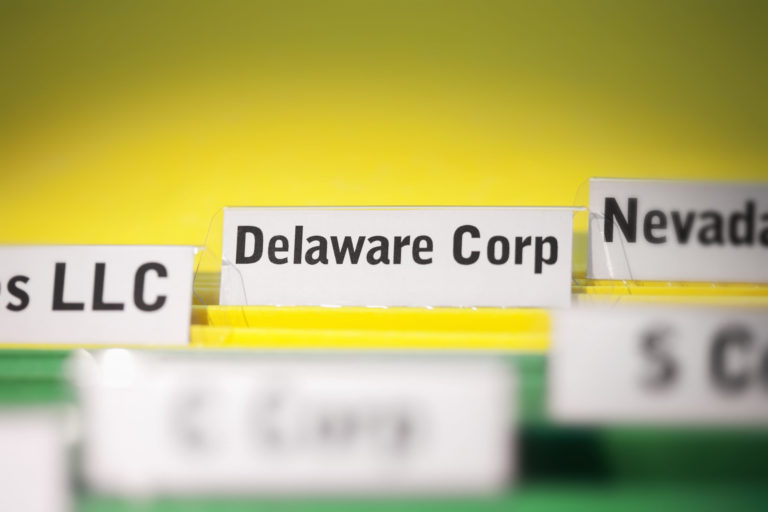When you have a great idea for a new business, you want to hit the ground running. Navigating the formation of your business is the last thing you want to get bogged down in. But determining the best entity structure for you and the state to form your business in can impact its organization and potential for growth. Making these decisions might not be as complicated (or expensive) as you might expect. Let’s look at some common questions about forming your business:
What are the benefits of a Delaware C Corp?
Delaware is informally known as the “Corporation State” due to its steady rise to leadership in public company incorporation since the late 19th Century, when its corporate law was modified to be more business-friendly. Today, companies turn to Delaware for its “consistency, predictability, stability and quality” within the business world. See Delaware Corporate Law Facts and Myths.
The Legacy of Delaware as the “Corporation State”
Delaware’s Corporate Law focuses on only the internal operations of your company. Delaware has other laws governing business behavior, which typically will apply if your company operates within Delaware. If your business operates outside of Delaware, the law of the state where your place of business is located will likely govern your business’s conduct. See About Delaware’s General Corporation Law. The narrow focus of Delaware Corporate Law on management of and investment in corporations can make multistate legal compliance easier to navigate.
Delaware’s Corporate Law: Internal Operations and Compliance
The Corporate Law is also designed for companies to choose the operating procedures that work for them. There are relatively few elements that are required for companies to comply with and these requirements are narrowly designed to protect investors. See id. As to the rest of corporate governance, great deference is given to the company’s bylaws and the Board of Directors.
Delaware also has established case law regarding corporations. It has a separate court to hear cases involving corporate law, the Court of Chancery. The judges on the Court of Chancery are experienced in corporate law. All of these elements lend to enhanced dependability in corporate judicial decisions.
What’s the difference between a C-Corporation and an LLC?
The designation “C-Corporation” refers to a company’s tax status. C-Corporations are taxed on their income at the corporate income tax rate and shareholders are taxed on distributions at their personal income tax rate. While some businesses are leery of this “double taxation,” recent lowering of the corporate tax rate has made C-Corporations a more favorable tax choice for businesses.
In Delaware, a C-Corporation is owned by shareholders through the ownership of stock in the corporation. As owners, shareholders’ liability is limited up to the value of the capital they put into the corporation. A C-Corporation is typically governed by a Board of Directors and managed by officers, who are selected by the Board. While the Board makes most decisions for the company, some decisions are statutorily required to be made by shareholders. C-Corporations raise capital through publicly or privately offering to sell their stock (either common or preferred). Stock options can be granted to employees, including Incentive Stock Options (ISOs). Yearly, Delaware corporations must file an Annual Report and, unless exempted, must pay franchise taxes. Delaware is considered to have low franchise taxes.
A Delaware LLC is controlled by one or more members and the member’s liability, like a C-Corporation, is limited to the amount of capital they put into to the LLC. But an LLC can either be taxed as a partnership or a corporation (referred to as “pass-through” taxation). An LLC is either member-managed or manager-managed by an individual, another legal entity or a Board of Managers. LLCs can issue membership interests in order to raise capital but these are typically through private, not public, offerings. LLCs can offer employees profit interests, but accepting those interests can mean the employee is viewed as a partner. ISOs are not available to LLCs, instead LLC can offer unit appreciation rights (UARs), which do not have the same tax benefits as ISOs. Yearly, Delaware LLCs pay a flat tax, currently $300, to the Secretary of State.
Should I form my business as a C-Corporation on an LLC?
When choosing an entity structure, it is important to remember that the business is not married to that structure. As the needs and direction of your business change, so too can its entity structure. Indeed, making changes can streamline operations, investment, and growth. Here are some questions to consider when deciding on an entity structure:
- Has your business existed for multiple years?
- Are you looking to grow your business, such as through accepting more investments or becoming a publicly traded company?
- Do you plan to raise capital from institutional investors such as VCs?
- Are you planning to hire employees? Will those employees be offered incentive plans?
- Are you planning to hold your shares for at least 5 years before the sale of the company?
If your answers to these questions are yes, then incorporation as a Delaware C-Corporation might be right for you. Conversion is also an option down the road if you start as a LLC and need to change your entity structure for a variety of reasons.
How can NEXT help me form my business?
NEXT has fixed-fee packages to help you form your business s under the structure of your choice, including as a C-Corporation or an LLC. The startup attorneys at NEXT can also help you decide which state is right for formation of your business. For additional information or to schedule a consultation, please contact NEXT at [email protected].



